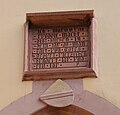Rudolf III, Margrave of Hachberg-Sausenberg
Rudolf III, Margrave of Hachberg-Sausenberg | |
|---|---|
 Portrait of Rudolf III on his tomb in the Gallus church in Rötteln | |
| Born | 1343 |
| Died | 1428 |
| Buried | Gallus Church in Rötteln |
| Noble family | House of Zähringen |
| Spouse(s) | Adelheid of Lichtenberg Anne of Freiburg-Neuchâtel |
| Issue | Otto III of Hachberg William, Margrave of Hachberg-Sausenberg |
| Father | Rudolf II, Margrave of Hachberg-Sausenberg |
| Mother | Catherine of Thierstein |
Margrave Rudolf III of Hachberg-Sausenberg (1343–1428) was the son of Margrave Rudolf II of Hachberg-Sausenberg and Catherine of Thierstein. He inherited Hachberg-Sausenberg when his father died in 1352. As he was a minor at the time, his uncle Otto I acted as regent. When Rudolf II came of age, he and Otto I ruled jointly, until Otto's death in 1384. Rudolf III is considered the most important of the Margraves of Hachberg-Sausenberg.[1]
Reign
Construction activities
Rudolf III initiated a number of construction projects. Two gatehouses, one large building and a tower were added to his residence Rötteln Castle in 1360. In 1387 and 1392, other large buildings were added. In 1401, he built a church in the village of Rötteln (now the Evangelical Church). In 1418, he expanded this church to the main church of his territory. Rudolf's tomb and the tomb of his second wife, Anna, both in this church, are considered major examples of Gothic art in the Upper Rhine.[2]
Expansion of the country's sovereignty
During his long reign, Rudolf was able to extend his country's sovereignty significantly:
- In 1365, he exchanged the village Huttinger against Höllstein (with the Bishop of Basel)
- In 1366, he received a share of Sausenberg from his uncle Otto I
- In 1368 he purchased the villages of Weil am Rhein, Wintersweiler, Welmlingen, plus some manors in Haltingen and the city and district of Otlikon from Knight Konrad of Münch.[3] He also purchased Dossebach from William of Hauenstein and his son Henman of Hauenstein
- In 1394, Bishop Conrad of Münch, enfeoffed him with a fief in Breisgau[4]
- In 1400, he purchased the Lordship of Neuenstein, including the villages of Gersbach, Schlechtbach, Raitbach, Kürnberg and Schweigmatt.[5] Neuenstein Castle had been enfoeffed to the monastery of St. Blasien, but in 1401, the monastery renounced its rights on the castle.[6]
Marriage and issue
Rudolf III first married Adelheid of Lichtenberg and later Anne of Freiburg-Neuchâtel. On 13 February 1387, Rudolf closed a marriage contract with Konrad of Freiburg and Else of Neuchâtel for Konrad's 13-year-old sister Anna. Her dowry would be 12000florins, in the form of the city and district of Sennheim valued at 7500 florins, Istein Castle, valued at 3000 florins, 1500 florins in cash, on the condition that he would use it to create manors in the area between Hauenstein, the forest and the mountains on both sides of the river, within one year after the wedding.[7] With Anne, he had seven sons and six daughters. One son and three daughters fell victim to the plague in 1420. His son Otto (1388–1451) was Bishop of Constance from 1411 to 1434 as Otto III of Hachberg and was the host of the Council of Constance in 1415. As such, he was involved in the burning at the stake of the Czech reformer Jan Hus. The only other son to survive him, was the youngest, William, who succeeded him in 1428.
See also
References
- Fritz Schülin: Rötteln-Haagen, Beiträge zur Orts-, Landschafts- und Siedlungsgeschichte, Lörrach 1965, p. 65.
- Fritz Schülin: Binzen, Beiträge zur Orts-, Landschafts- und Siedlungsgeschichte, Schopfheim 1967, p. 523-524 (genealogical tables of the House of Hachberg-Sausenberg).
- Karl Seith: Die Burg Rötteln im Wandel ihrer Herrengeschlechter, Ein Beitrag zur Geschichte und Baugeschichte der Burg, Röttelbund e.V., Haagen, undated, p. 6, according to Schülin in: Das Markgräflerland, vol. 3, issue 1, 1931
- Gerhard Möhring: Chronologie zu Markgraf Rudolf III. von Hachberg, Herr zu Sausenberg und Rötteln (1343-1428), in: Das Markgräflerland, vol. 1, p. 53-63, Schopfheim, 2001
- Regesten der Markgrafen von Baden und Hachberg 1050 – 1515, Baden Historical Commission, edited by Richard Fester, Innsbruck, 1892 online
- Johann Christian Sachs: Einleitung in die Geschichte der Marggravschaft und des marggrävlichen altfürstlichen Hauses Baden, Frankfurt and Leipzig, 1764, part 1 at Google Books
Historical novel
- Elke Bader: Anna von Rötteln — im Hagelsturm der Begierde, Jakobus-Verlag, Barsbüttel, 2008, ISBN 978-3-940302-11-3 (this Anna von Rötteln is Anne of Freiburg)
External links
Footnotes
- ^ Fritz Schülin: Rötteln-Haagen, Beiträge zur Orts-, Landschafts- und Siedlungsgeschichte, Lörrach 1965; p. 65.
- ^ Karl Seith: Die Burg Rötteln im Wandel ihrer Herrengeschlechter, Ein Beitrag zur Geschichte und Baugeschichte der Burg, Röttelbund e.V., Haagen, undated
- ^ Regesten der Markgrafen..., Vol. 1, deed number h690
- ^ Regesten der Markgrafen..., Vol. 1, deed number h799 and h800
- ^ Regesten der Markgrafen..., Vol. 1, deed number h857
- ^ Regesten der Markgrafen..., Vol. 1, deed number h859
- ^ Regesten der Markgrafen von Baden und Hachberg, vol. 1, deed number h751





